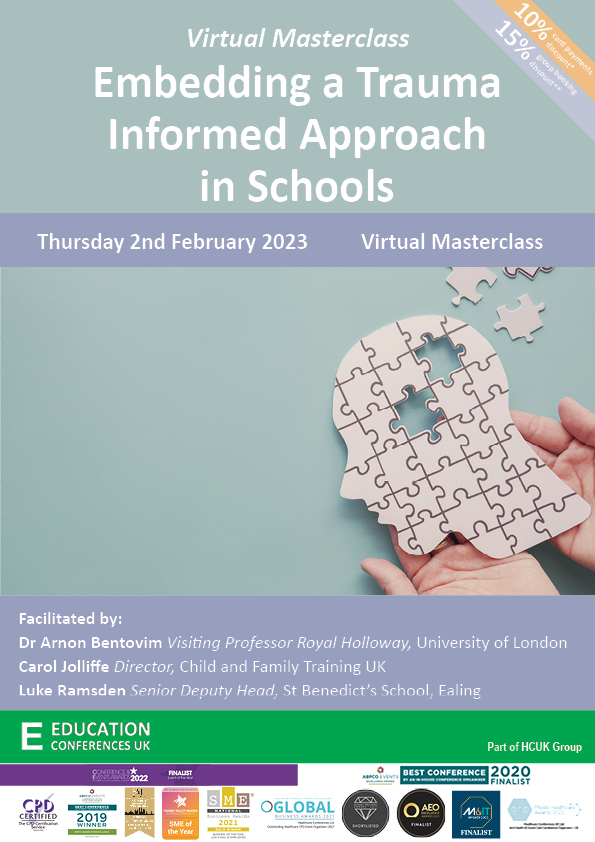Find out more about virtual attendance
This Masterclass will introduce trauma informed approaches to working with children and young
people, which integrate evidence-based approaches.
“As a setting where children and adolescents live and learn, linked to the family and embedded within the wider community, schools have an important influence on every student’s health”
Around one in three children and young people will be exposed to at least one potentially traumatic event by the time they are 18, which can have a huge impact on their wellbeing, development and mental health.
During this one-day masterclass our experts will introduce the concept of trauma-informed, looking at what it means in practice for your school and what you need to do in order to take a traumainformed approach. You will consider how you can take steps to develop a compassionate school and classroom to support children’s development. You will take a detailed look at how your school should respond to distress, and how to support pupils to do the same.
Senior Mental Health Leads, Pastoral Leads, Designated Safeguarding Leads, School Counsellors,
School Nurses, SENCOs, members of the SLT should attend.
Masterclass Aims and Objectives
- Understand the impact of trauma on children and young people
- Understand the benefits and impact of a trauma-informed approach
- Be able to implement trauma informed classroom strategies
- Provide staff with the knowledge and tools they need to support children with common mental health challenges following trauma
- Understanding the link between adversity and troubling mental health problems
- Identify the role of the school in dealing with distress
- Be clear on the benefits of promoting well-being across your school and how it can best be done
- Put steps in place to help prevent mental health disorders
- See the school as an institution to develop a compassionate culture and classroom management
- Introducing The MindEd ACEs Training for schools
Facilitators
Arnon Bentovim trained in Psychiatry at the Maudsley Hospital/ Institute of psychiatry, and as a Psychoanalyst, and systemic/ family therapist. He helped to establish the Association and Institute of Family Therapy, and researched measures of family functioning, and clinical approaches at the Institute of Child Health, Great Ormond Street Children’s hospital, and the Tavistock Clinic. He took responsibility for the management of child protection at the Hospital, and he and colleagues established the Child Sexual Abuse Assessment and Treatment Service the first comprehensive service in the UK, and a service to assess the risk and therapeutic needs of maltreated children.
Carol Jolliffe has worked for Child and Family Training since 2000 and is accredited as a trainer for the range of assessment and intervention tools. She has trained for Child and Family Training in a range of social care and health settings in UK, Ireland, Egypt, Cyprus, Sweden, Germany and Hong Kong. She is currently involved in developing their family work focused training courses. She has worked with children and families in social work and children’s mental health services since 1979.
Luke Ramsden is an award-winning senior deputy headmaster and senior safeguarding lead at St Benedict’s School in Ealing. He started his teaching career at Tonbridge School where he was Head of History and was then a Housemaster at Ampleforth College before moving to Ealing. In his role as Senior Deputy Head he is responsible for the day-to-day running of the school, as well as the pastoral oversight of all the students and overseeing the school’s PSHE programme (among a number of other roles) In his time at St Benedict’s the school has become a flagship school for safeguarding and pastoral care, with the happiness of every student placed firmly at the heart of all the school does.



